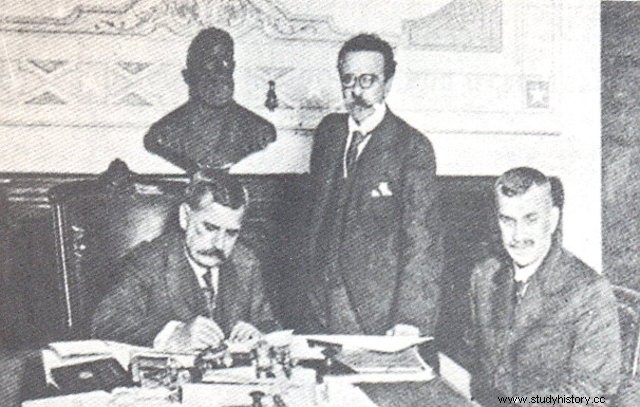
Brazil had a modest participation in the First World War (1914-1918), since it did not have great military resources. Therefore, the country limited itself to providing punctual support, in collaboration with air and sea combats, as well as helping the wounded on the battlefields. In order to understand the reasons that led Brazil to enter the “Grande War ”, it is necessary that we know a little about the diplomatic context of the time.
Change of the Brazilian diplomatic axis
During the entire imperial phase and even before 1822, when Brazil was part of the United Kingdom of Portugal and the Algarves, Brazil was diplomatically linked to England, so that its political-economic transit took place more in the transatlantic relationship than with the American continent. The advent of the Republic , in 1889, changed this situation, as Brazil shifted its diplomatic axis from London to Washington, thus adhering to the perspective of the Monroe Doctrine, defended by the United States.
October 26:Declaration of War
On April 3, 1917, a US merchant ship was torpedoed by German submarines and, on the same day, a Brazilian ship was also torpedoed in the English Channel. This provoked the rupture of the diplomatic relations of the two countries with the German Empire. Shortly thereafter, the United States entered the war against the Austrian-German alliance. After other Brazilian ships were torpedoed again, off the coast of the Mediterranean Sea, then-President Venceslau Brás signed – after congressional approval – the declaration of war against the Triplice Alliance on October 26, 1917 .
With the formalization of the declaration of war, the first measure that the Brazilian government took was to contain an eventual uprising of immigrants and descendants of German immigrants in the national territory. On November 16, a law was passed in Congress that prohibited, according to historian Olivier Compagnon:
[…] to Germans established in the country any trade and any financial relationship with abroad, puts an end to public contracts involving German suppliers and prohibits Germans obtaining land concessions. German banks and insurance companies are subject to exceptional scrutiny. [1]
The proper war measures were taken months later.
Occasional participation in the war
Brazil sent a division of seven combat ships to war. Among them were the cruisers Bahia and Rio Grande do Sul and the destroyers Piauí , Rio Grande do Norte , Paraíba and Santa Catarina . This division, according to historian Luís de Alencar Araripe, on May 7, 1918:
[…] set sail for Gibraltar, where he would join the British fleet to participate in anti-submarine warfare. The War Operations Division, composed of two cruisers and five destroyers, an auxiliary ship and a tug, under the command of Rear Admiral Pedro Max Fernando de Frontin. The Division only arrived in Gibraltar in November 1918, held back on the African coast by the terrible pandemic that was the Spanish flu. [2]
In addition to this maritime division, Brazil's other punctual contribution to the war took place in the air combat, in aid of British warplanes and the wounded in combat. As the historian Alencar Araripe points out, again:
Brazilian aviators fought alongside British and French pilots. Army officers served on the Western Front in French Army units. One of them, Lieutenant José Pessoa Cavalcanti de Albuquerque, as a general, was the great reformer of the Military School of Realengo, creator of the mystique of the Caxias cadet. Eighty-six physicians, including seventeen professors of Medicine, almost all civilians, official commissioned, integrated the Medical Mission that left Brazil on August 18, 1918 and until the end of the war worked at the Franco-Brasileiro hospital, maintained by Brazilians residing in Paris. [3]
The Brazilians remained in Europe until the first months of 1919. On June 25 of that same year, the Naval War Operations Division was dissolved.
NOTES
[1] COMPAGNON, Olivier. Farewell to Europe:Latin America and the Great War. trans. Carlos Nougué. Rio de Janeiro:Rocco, 2014. p. 146.
[2] ARARIPE, Luís de Alencar. "First World War". In:MAGNOLI, Demetrius. History of the Wars . São Paulo:Context, 2013. p. 342-343.
[3] Ibid . P. 343.
By me. Claudio Fernandes
